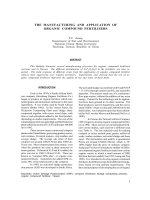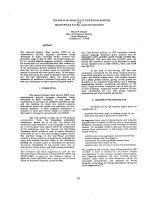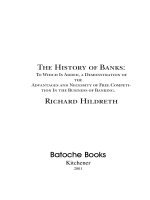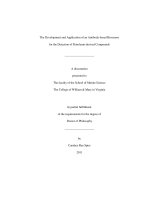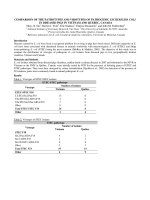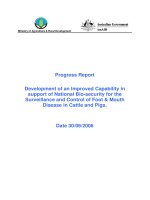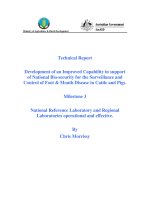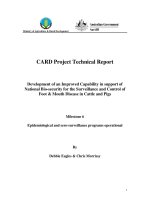The awareness and application of sustainable construction concept in viet nam (tt)
Bạn đang xem bản rút gọn của tài liệu. Xem và tải ngay bản đầy đủ của tài liệu tại đây (268.26 KB, 8 trang )
!"#$%&'()*(&+,(-$.%&(/01.2)03,0&(
‘
‘The awareness and application of sustainable construction
concept in Viet Nam’
By
Truong Quynh Chau
A Thesis submitted in partial fulfillment of the requirements for the degree of Master of
Construction Project Management in Professional Practice at The University of New South
Wales
November 2015
Master of Construction Project Management in Professional Practice – Research Project
Copyright © Truong Quynh Chau 2015.
This publication may not be reproduced in any material form, whether in whole or in part,
(including photocopying or storing it in any medium by electronic means) without the written
permission of the author. Applications for the author’s written permission to reproduce any part
of this publication should be addressed to the author.
Truong Quynh Chau - 5026196
2
Master of Construction Project Management in Professional Practice – Research Project
ASTRACT
Sustainable development is a new trend within the construction industry in Vietnam
whereby the government and players try to find new construction approaches to protect
the environment and enhance the quality of life. The aim of this paper is to investigate
the awareness, knowledge and the implementation level of sustainable practices amongst
construction practitioners in Vietnam. Also, the paper attempts to give some
recommendations that can enhance the awareness and the application of green building in
Vietnam. An online questionnaire was distributed to practitioners within five categories
of stakeholders, including clients, designers, contractors, project managers and suppliers.
A total of 203 professionals completed the survey. The results of the data analysis show
that the construction industry in Vietnam is witnessing a rising awareness of
sustainability in which more people are interested in green building concepts and have a
certain knowledge of this subject. The results suggest that there are different perceptions
and inconsistencies among various players on some issues related to sustainable
practices, such as higher project costs or the complex construction of green buildings.
Also, despite the growing awareness, most respondents believe that sustainable practices
are at a low level of implementation due to some reasons, primarily lack of enforcement
and clear federal policy, followed by the cost sensitivities of green buildings. Finally, the
study recommends the key role of the Vietnamese government in promoting the
implementation of green buildings and the significant contribution of education and
training in improving knowledge and understanding of sustainable concepts for
practitioners.
Truong Quynh Chau - 5026196
3
Master of Construction Project Management in Professional Practice – Research Project
Acknowledgements
There are many people and organisations that I need to thank in recognition of their
support and guidance in helping me finish this paper.
Firstly, I must thank my family, who have always been with me throughout my master
degree and encourage me to conduct the thesis with their belief of my capability.
I would like to show my respect to my supervisor, Prof. Paul Osmond for his continued
guidance in writing this paper. His directions to my topic are valuable to enhance the
quality of the study.
I would like to say thank the Faculty of Project Management, Da Nang University, for
their support on both the professional and academic levels. Without them, I could not
finish the online questionnaire with 203 responses from construction professionals.
Last but not least, I would like to thank all respondents for participating my online
survey, who have significantly contributed to my research.
Truong Quynh Chau - 5026196
4
Master of Construction Project Management in Professional Practice – Research Project
TABLE OF CONTENTS
ASTRACT ..................................................................................................................................... 3
Acknowledgements ....................................................................................................................... 4
CHAPTER 1
INTRODUCTION .......................................................................................... 9
1.1 Research background ........................................................................................................... 9
1.2. Sustainable construction agenda in Vietnam .................................................................... 10
1.3 Research questions ............................................................................................................. 11
1.4 Research Aims and Objectives ........................................................................................... 12
1.5 Research method ................................................................................................................ 12
1.6 Thesis Structure .................................................................................................................. 12
CHAPTER 2
LITERATURE REVIEW ............................................................................. 14
2.1 The concept of sustainable development ............................................................................ 14
2.2 Defining sustainable construction ...................................................................................... 15
2.2.1. Construction ........................................................................................................... 15
2.2.2.The impact of construction on sustainable development ........................................ 16
2.2.3 Sustainable construction .......................................................................................... 17
2.3 Costs and benefits of sustainable construction .................................................................. 19
2.4 Barriers for sustainable construction implementation....................................................... 21
2.5 Building sustainability rating systems................................................................................ 21
2.6 Sustainable building practices in Vietnam and some Asian countries............................... 25
2.6 Summary and conclusion ................................................................................................... 29
CHAPTER 3
RESEARCH METHODOLOGY ................................................................ 31
3.1 Research Design ................................................................................................................. 31
3.2 Questionnaire Development ............................................................................................... 33
3.2.1 Organisation of Questionnaire ................................................................................. 33
3.2.2 Pilot Testing............................................................................................................. 36
3.3 Sampling Method................................................................................................................ 36
3.4 Data collection Process ..................................................................................................... 37
3.5 Data Analysis Approach..................................................................................................... 38
3.6 Procedure for storing behavioural data............................................................................. 38
3.7 Ethical Considerations ....................................................................................................... 38
3.8 Summary ............................................................................................................................. 39
Truong Quynh Chau - 5026196
5
Master of Construction Project Management in Professional Practice – Research Project
CHAPTER 4
RESULTS AND DATA ANALYSIS ........................................................ 40
4.1 Analysis of the demographic data ...................................................................................... 40
4.1.1 Category of respondents .......................................................................................... 42
4.1.2 Sector of organisation .............................................................................................. 42
4.1.3 Size of organisation ................................................................................................. 43
4.1.4 Experience of respondents ....................................................................................... 43
4.1.5 Number of green buildings involved ....................................................................... 44
4.2 Awareness of sustainability ................................................................................................ 44
4.2.1 Awareness of basic concept of sustainable construction ......................................... 45
4.2.2 Familiarity with existing rating systems.................................................................. 46
4.2.3 Perceived importance of seven elements of sustainable construction development 47
4.2.4 Opinion about sustainable practices ........................................................................ 49
4.2.5 Stages of construction that sustainability should be considered ............................. 53
4.3 Implementation of sustainability practices and challenges ............................................... 54
4.3.1 Level of implementation of sustainable practices ................................................... 54
4.3.2 Frequency of use of sustainable practices ............................................................... 55
4.3.3 Barriers for sustainable construction practices ........................................................ 56
4.4 Future outlooks for sustainable construction..................................................................... 58
4.4.1 Prospect of sustainable construction in the next 5–10 years ................................... 58
4.4.2 Interest level of sustainable construction ................................................................ 59
4.4.3 Improving sustainability knowledge ....................................................................... 60
4.5 Summary and recommendations ........................................................................................ 61
CHAPTER 5
CONCLUSION ......................................................................................... 64
APPENDIX A
QUESTIONNAIRE SURVEY
APPENDIX B
HUMAN RESEARCH ETHICS APPROVAL
REFERENCES
Truong Quynh Chau - 5026196
6
Master of Construction Project Management in Professional Practice – Research Project
LIST OF FIGURES
Figure 2.1
Sectors engaging in green practices in Vietnam
28
Figure 4.1
Demographic distribution of responses according to
‘category of respondents’
42
Figure 4.2
Demographic distribution of responses according to ‘size
of organisation’
43
Figure 4.3
Demographic distribution of responses according to
‘experience of respondents’
44
Figure 4.4
Familiarity level with sustainable rating systems
47
Figure 4.5
Level of implementation of sustainable practices
55
Figure 4.6
Prospect of sustainable construction in the next 5–10
years
58
Figure 4.7
Interest level of sustainable construction
59
Truong Quynh Chau - 5026196
7
Master of Construction Project Management in Professional Practice – Research Project
LIST OF TABLES
Table 4.1
Summary of respondent’s demographic data
42
Table 4.2
Awareness of the concept of sustainable construction
45
Table 4.3
Awareness of the Vietnam Green Building Council
45
Table 4.4
Awareness of the three dimensions of the sustainable
building concept
46
Table 4.5
Elements of Sustainable construction development:
frequency and relative importance index (RII)
48
Table 4.6
Responses to Likert Scale questions related to opinions
of sustainable practices among various categories of
respondents
50
Table 4.7
Respondents’ attitudes on sustainable construction within
each category
53
Table 4.8
Stages of construction that sustainability should be
considered
53
Table 4.9
Frequency of use of sustainable practices
56
Table 4.10
Barriers for sustainable practices
57
Table 4.11
Prospect of sustainable construction in the next 5–10
years
59
Table 4.12
Methods/means suitable to improve sustainability
knowledge
60
Truong Quynh Chau - 5026196
8
